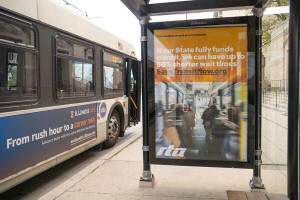With 1 month left in session, lawmakers near deal on public transit
reform
[May 01, 2025]
By Andrew Adams and Ben Szalinski
Lawmakers apparently are close to a deal to resolve one of Springfield’s
most hotly contested issues this session: transit reform.
Public transit agencies in Chicagoland — a region with roughly
two-thirds of Illinois’ population — face a collective $770 million
budget gap in the upcoming fiscal year. Heads of the agencies have
turned to the state to fill that gap, but lawmakers have consistently
said that reform of the agencies’ government and better oversight are
required before addressing funding.
If lawmakers don’t reach a deal to reform the northeastern Illinois
transit system and introduce new funding before their May 31
adjournment, transit officials say it will result in significant cuts,
which would result in a “nightmare scenario,” according to Regional
Transportation Authority spokesperson Tina Fassett Smith.
Sen. Don DeWitte, R-St. Charles, told reporters this week that lawmakers
in the Senate “are very close to agreed language on governance,” meaning
a deal is close.
DeWitte, a longtime former mayor of suburban St. Charles and ranking
Republican on the Senate’s Transportation committee, said the deal would
leave in place the three “service boards” that operate transit in
Chicago and the suburbs: the Chicago Transit Authority, Metra commuter
rail service and Pace Suburban Bus.
The agreement, according to DeWitte, would provide new oversight powers
to a “newly empowered” RTA, the agency that currently handles some
financial oversight for the region’s transit agencies.
DeWitte was on the 16-member board of directors for the RTA for five
years before joining the Illinois Senate.

Several proposals for reform have been pitched in recent months, with
the plan outlined by DeWitte being similar to what he called the “labor
bill” — a plan initially put forward by a coalition of organized labor
groups and unions.
But the brief description has superficial similarities to a plan
proposed by RTA chairman and former Republican state senator Kirk
Dillard. That plan also would empower the RTA
A more aggressive reform plan, which would have dissolved the three
service boards and consolidated them into one agency, was proposed by
transit activists and environmentalists. That consolidation plan was
formalized into bills presented by Chicago Democrats Sen. Ram Villivalam
and Rep. Eva-Dina Delgado.
While DeWitte is familiar with the negotiations, others involved differ
on how close lawmakers are to a deal.
Villivalam, who chairs the Senate Transportation Committee, said he and
his colleagues are “continuing discussions” about the bill.
“As we head into the remaining weeks of our spring legislative session,
I look forward to working toward a solution that provides safe,
reliable, accessible, and integrated public transit to the northeastern
Illinois region,” Villivalam said in a statement.
The House of Representatives might bring other hurdles to a transit
reform deal as lawmakers barrel toward their expected adjournment.
Rep. Marty Moylan, D-Des Plaines, who chairs a House committee that
would likely hear a transit reform bill, has said repeatedly that no
bill will be called in his committee that doesn’t meet his standards,
including addressing concerns about safety on trains and buses.
But he echoed DeWitte’s read on the situation that a proposal similar to
organized labor’s pitch will win out.

[to top of second column]
|

The Regional Transportation Authority began an ad campaign in April
describing the need for state action to resolve financial issues at
the transit agency. One of the campaign’s billboards is pictured at
a bus stop on Chicago’s Lake Shore Drive. (Capitol News Illinois
photo by Andrew Adams)

“That seems to be the consensus of the General Assembly: Leave the
boards in, have them do some reforms, and let’s move forward,” Moylan
told Capitol News Illinois. “We’re making progress with some of the
transit agencies. The RTA still doesn’t get it, but they will by the
end.”
‘Irresponsible’ PR campaign
The RTA, to raise awareness and potentially influence negotiations in
Springfield, launched the “Save Transit Now” ad campaign earlier this
month. That campaign features television and radio ads in English and
Spanish as well as ads on billboards, digital signs, newspapers and
social media.
The campaign encourages RTA riders to write emails to their lawmakers
with the subject line “Save Transit Now: Support $1.5 billion and an
empowered RTA” and a prewritten message.
This frustrated several lawmakers involved in transit negotiations.
“To cry broke with one hand and drop three-quarters of a million dollars
on a PR campaign with the other is wrong, and frankly, it’s
irresponsible,” Rep. Kam Buckner, D-Chicago, wrote in the Chicago
Tribune on Tuesday.
Buckner chairs the informal “working group” responsible for negotiating
transit issues in the House.
Moylan, meanwhile, said the agency was “wasting all kinds of money” on
the campaign, which isn’t going to make the General Assembly change its
policies.
“It’s not how it works,” Moylan said. “It may have worked years ago, but
not now.”
Fassett Smith, the director of communications at the RTA, said the
$750,000 price tag was an upper estimate of the cost and said it is the
agencies’ “obligation” to make sure transit riders were aware of the
RTA’s dire financial straits.
Another potential wrinkle as lawmakers wrap up negotiations comes from
Chicago Mayor Brandon Johnson, who is in Springfield this week to meet
with lawmakers about the city’s legislative priorities. Among them:
transit funding.

“The city of Chicago deserves its fair share, and we’re going to
continue to advocate for that, as I’ve already done,” Johnson said at a
Tuesday news conference.
Johnson has a strained relationship with lawmakers in Springfield after
several perceived missteps since he took office, including dragging his
feet in funding migrant aid last year, arriving late in legislative
sessions to discuss budget matters, and publicly clashing with Gov. JB
Pritzker and other lawmakers over hemp regulation earlier this year.
Johnson has repeatedly in recent months pointed out that Chicagoans make
up the majority of ridership among the three transit agencies that make
up the RTA. When asked Tuesday whether that means Chicagoans should also
be funding a majority of public transportation in the region, Johnson
didn’t rule it out.
“That’s a conclusion that one could draw,” Johnson said.
Capitol News Illinois is
a nonprofit, nonpartisan news service that distributes state government
coverage to hundreds of news outlets statewide. It is funded primarily
by the Illinois Press Foundation and the Robert R. McCormick Foundation. |